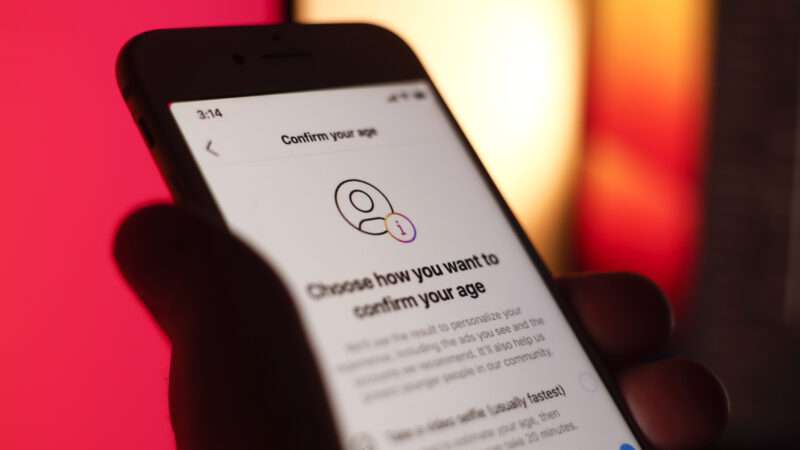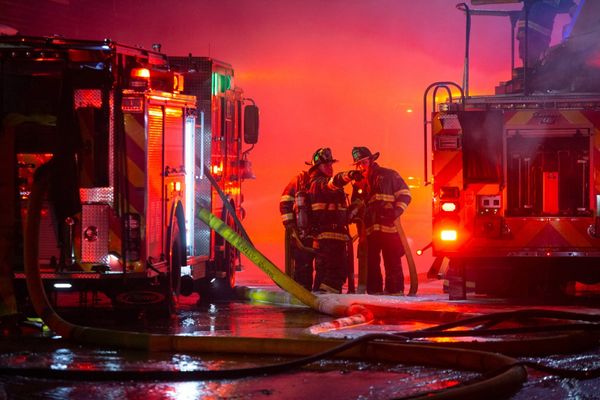
Two laws requiring age verification online have been paused by federal courts. The laws in Indiana and Mississippi are now on hold as legal challenges to them play out.
The Indiana law (Senate Bill 17) says visitors to websites that display pornography or other "adult oriented" content that is "harmful to minors" must submit a copy of their driver's license or otherwise verify that they're at least 18 years old.
The Mississippi law (House Bill 1126, also known as the Walker Montgomery Protecting Children Online Act) says social media platforms must verify people's ages before letting them create accounts and bar minors from creating accounts without providing the "express consent of a parent or guardian." It also tasks social media companies with the impossible feat of preventing or mitigating minors' exposure to any material that might promote or facilitate various harms, including eating disorders, suicidal thoughts, harassment, "grooming," and bullying.
Laws like these have been sweeping U.S. states this year and last, and represent a growing threat to privacy, anonymity, and free speech online.
Federal courts have largely ruled against them when they are challenged, but this has not been universal. So, it's probably good that the Supreme Court has agreed to take up one such case.
SCOTUS Will Hear Case Concerning Texas Porn Law
On Tuesday, the Court announced that it would hear Free Speech Coalition et al. v. Ken Paxton, a case involving an adult-content age check law in Texas.
The Texas law—House Bill 1181—requires websites that feature adult content to use "reasonable age verification methods…to verify that an individual attempting to access the material is 18 years of age or older." It also says they must post a warning about the alleged harms caused by pornography.
Last fall, a U.S. District Court put enforcement of both parts of the law on hold. But the U.S. Court of Appeals for the 5th Circuit had different plans, vacating the injunction as it applied to the age verification component. That left Texas free to start enforcing the law, and it has.
In April, the Free Speech Coalition (an adult industry trade group) and the other plaintiffs asked the Supreme Court to intervene quickly to stop enforcement.
The Court denied this request for a stay. But it has decided to take up the case in full.
Opponents of H.B. 1181 argue that it has implications far beyond web porn platforms. From Law360:
Several outside organizations have weighed in on the case, including free speech and civil liberties groups. In a May amici curiae brief, the American Booksellers for Free Expression and other industry groups said that the Fifth Circuit's decision would have far-reaching implications for bookstores, libraries, publishers, authors and mainstream websites.
"The Supreme Court is right to review the case, and the Fifth Circuit's ruling allowed the government to rob adults of their online privacy and burden their access to protected speech under the guise of protecting children," Vera Eidelman, staff attorney with the ACLU's Speech, Privacy, and Technology Project and counsel for the coalition, said in an emailed statement.
"Over the years, we've seen similar misguided laws about everything from drive-in movies to video games to websites, and courts have repeatedly struck these laws down," Eidelman said. "We look forward to defending the First Amendment rights of all Americans to access the internet free from surveillance and suppression."
Free Speech Coalition Executive Director Alison Boden issued a statement saying that "despite proponents' claims, online age verification is simply not the same as flashing an ID at a check-out counter. The process is invasive and burdensome, with significant privacy risks for adult consumers. Sexual expression is the canary in the coal mine of free speech."
'Age Verification Requirements Are Likely Unconstitutional'
As with so many things, Texas may have been a bad influence here. Indiana's S.B. 17—a copycat of H.B. 1181, minus the health warning requirement—was scheduled to take effect on July 1.
Last Friday, however, Judge Richard Young of the U.S. District Court for the Southern District of Indiana declared that "Indiana's age verification requirements are likely unconstitutional." Young issued a preliminary injunction against enforcement of the law.
"The age verification provisions place burdens on a significant amount of speech protected by the First Amendment," Young points out in his ruling. They are not limited to websites that publish obscenity (which is not protected by the First Amendment). Nor are they limited to sites where all or most of the content falls into the category that Indiana deems harmful for minors. Rather, they apply to any platform where one-third of the content could be categorized that way.
"The one-third requirement triggers age verification requirements regardless of the content the viewer seeks to access," Young writes. "In other words, age verification burdens must be imposed on adults attempting to access material perfectly appropriate for minors because other parts of the website may have material inappropriate for a minor. Indeed, the Act imposes burdens on adults accessing constitutionally protected speech even when the majority of a website contains entirely acceptable, and constitutionally protected, material."
'Serious Doubts About Whether the Government Is in Fact Pursuing the Interest It Invokes'
Mississippi H.B. 1126 takes its cues from Utah, which passed a law last year banning minors from starting social media accounts or requiring them to get parental permission to join. The Mississippi law was passed in late April and was quickly challenged by the tech industry trade group NetChoice.
On July 1, Judge Halil Suleyman Ozerden of the United States District Court for the Southern District of Mississippi issued a preliminary injunction against H.B. 1126.
"The Attorney General argues that H.B. 1126 does not regulate speech, but non-expressive conduct, which the State may regulate if it has a rational basis for doing so. But the Court is not persuaded that H.B. 1126 merely regulates non-expressive conduct," wrote Ozerden (in shades of this week's Supreme Court decision concerning NetChoice and the Texas and Florida social media laws). And while Ozerden accepted "the Attorney General's position that safeguarding the physical and psychological wellbeing of minors online is a compelling interest," he did not agree that the state had done so using the least broad means possible.
"There are a number of supervisory technologies available for parents to monitor their children that the State could publicize," and yet the state instead "requires all users (both adults and minors) to verify their ages before creating an account to access a broad range of protected speech on a broad range of covered websites," writes Ozerden. He notes that the law is overinclusive in that it "burdens adults' First Amendment rights," may lead platforms to aggressively moderate content in a way they otherwise would not, and applies to "all minors under the age of eighteen, regardless of age and level of maturity" and regardless of whether they "have parents who will care whether they create such accounts."
But it is simultaneously underinclusive because it only applies to certain sorts of websites, and excludes others where minors can create accounts (for instance, those that primarily function "to provide a user with access to news, sports, commerce, online video games or content primarily generated or selected by the digital service," notes Ozerden.
And this underinclusiveness calls into question the government's alleged motive for passing the law. He cites the 2011 case Brown, et al. v. Entertainment Merchants Association, in which the U.S. Supreme Court held that "underinclusiveness raises serious doubts about whether the government is in fact pursuing the interest it invokes, rather than disfavoring a particular speaker or viewpoint."
More Sex & Tech News
• The U.S. Supreme Court declined to take up a case involving Snapchat, Section 230, and sexual misconduct. Justices Clarence Thomas and Neil Gorsuch disagreed with this decision. In a dissent, Thomas—who has been hankering to take on a Section 230 and sex crimes case for a while—opined that "social-media platforms have increasingly used §230 as a get-out-of-jail free card."
• Iowa's Supreme Court has upheld a "heartbeat law" that bans abortion extremely early in pregnancy.
• Tim Wu self-parody alert. (For some backstory on Wu, see my 2022 article "Tim Wu, Biden's New Tech Guru, Is Deeply Wrong About What Makes the Internet Great.")
• A Tennessee "abortion trafficking" law took effect this week, after a judge denied two motions for temporary restraining orders against it. Hearings for preliminary injunctions against the law will take place later this summer.
• "Sacramento authorities are not only collecting drivers' information but sharing it with law enforcement agencies in other states—including states that criminalize abortion—all without a warrant," Reason's Joe Lancaster reports.
• Nevada residents will vote on an abortion access amendment this fall. "The Nevada secretary of state's office certified on Friday the ballot initiative to amend the State Constitution to include an explicit right to abortion after verifying the signatures required," according to The New York Times. Meanwhile, in Arizona: "A group seeking to get an abortion rights measure onto Arizona's November ballot says it has collected more signatures than any initiative in state history," KJZZ Phoenix reports.
Followup
Monday's newsletter covered the Supreme Court's decision in two First Amendment cases involving social media laws, in which the justices remanded the cases but made clear that social media moderation is a form of speech. Here's some other comments about the case from constitutional lawyers and policy scholars:
"The court rightly rejects the idea that lawmakers have more authority over speech online than they do offline," said Foundation for Individual Rights and Expression (FIRE) lawyer Robert Corn-Revere. "That's a big win for free speech and a free internet."
"Today's decision to neither uphold nor strike down Florida and Texas' social media laws, but instead to send the questions back to lower courts for a more thorough examination of the laws and their constitutionality, portends a free speech victory for the future of the Internet," said Jessica Melugin, director of the Competitive Enterprise Institute's Center for Technology and Innovation. "It would be hard to say it any better than the decision itself: 'However imperfect the private marketplace of ideas, here was a worse proposal—the government itself deciding when speech was imbalanced, and then coercing speakers to provide more of some views or less of others.'"
"The Court may be right on the principles—in our system of government, judges are supposed to resolve disputes over the law. But their unwillingness to resolve such disputes over social media—a well-established technology—is troubling given the rise of AI, which may present even thornier legal and Constitutional questions," said Mercatus Center researcher Dean Ball.
While the cases were remanded for further review, "it is still a big win for the First Amendment's protection of private ordering," said Ben Sperry, a senior scholar at the International Center for Law and Economics*. "The open questions have more to do with what the First Amendment would allow in terms of regulation of other online speech, such as instant messages, or what tier of scrutiny would apply in given situations. But this much is clear: the First Amendment does protect social-media platforms' right to serve their consumers through content-moderation policies."
Today's Image

*CORRECTION: This piece previously attributed a quote about the recent Supreme Court social media ruling to the wrong International Center for Law and Economics staff member.
The post Judges Block Indiana and Mississippi Age Verification Laws for Porn, Social Media appeared first on Reason.com.







